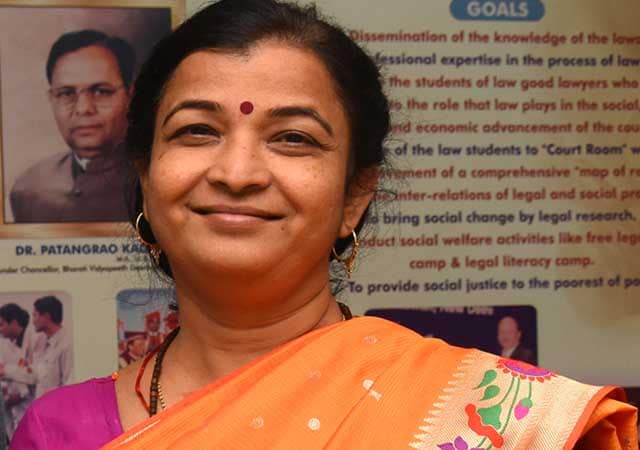Q As an eminent Law Faculty and Author on Law Books, how do you see the quality and relevance of teaching Law in India today?

 Law has always remained the crucial ladder to achieve the sweet fruits of justice and thus, the relevance of law and its teaching will never get old-fashioned. Of course, the quality sustenance and the quality enhancement through innovative and practical law teaching techniques is the need of the hour. The best way to ensure quality and excellence in law teaching is by embracing the New-Normal and also by adhering to the best practices which have brought revolutions in the holistic approach to teaching the law. Thorough and in-depth legal research, innovative quotient, inter-disciplinary approach, use of ICT and other digital teaching aids, continuous self-assessment, impact analysis and overall a global outlook are some of the hallmarks of teaching law in India today which is challenging yet fulfilling task. I firmly believe in the ‘Gladiator Model’ of Law Teaching while cautiously inculcating among students the paramount sense of Social Justice which is meant to serve even the poorest of the poor.
Law has always remained the crucial ladder to achieve the sweet fruits of justice and thus, the relevance of law and its teaching will never get old-fashioned. Of course, the quality sustenance and the quality enhancement through innovative and practical law teaching techniques is the need of the hour. The best way to ensure quality and excellence in law teaching is by embracing the New-Normal and also by adhering to the best practices which have brought revolutions in the holistic approach to teaching the law. Thorough and in-depth legal research, innovative quotient, inter-disciplinary approach, use of ICT and other digital teaching aids, continuous self-assessment, impact analysis and overall a global outlook are some of the hallmarks of teaching law in India today which is challenging yet fulfilling task. I firmly believe in the ‘Gladiator Model’ of Law Teaching while cautiously inculcating among students the paramount sense of Social Justice which is meant to serve even the poorest of the poor.
Q As per the Indian Constitution, there is a supremacy of Law in the country & yet people make a mockery of law in the name of agitations and protests. What are your considered views?
 The Indian Constitution clearly mandates the supreme law of the land and its entire edifice is dependent on the principle of the Rule of Law as propounded by Dicey. The Rule of law must at any cost be honoured and respected for it is only then we all can claim India to be the World’s largest successful democracy in its true sense. It is true that the democratic credentials of the country are measured by the agitations and protests but only as long as they remain peaceful and do not cause nuisance to the public at large. In fact, peaceful protests and agitations have always remained the harbinger of change and of many successful revolutions but only when such protests are not politically motivated and monitored. In such scenario, even potentially justified protests lose its significance and the very true purpose behind the same. We need to ensure a fair balance to keep the hope alive thereby providing leverage to agitations and protests in order to bring the ground breaking changes through peaceful and democratic means.
The Indian Constitution clearly mandates the supreme law of the land and its entire edifice is dependent on the principle of the Rule of Law as propounded by Dicey. The Rule of law must at any cost be honoured and respected for it is only then we all can claim India to be the World’s largest successful democracy in its true sense. It is true that the democratic credentials of the country are measured by the agitations and protests but only as long as they remain peaceful and do not cause nuisance to the public at large. In fact, peaceful protests and agitations have always remained the harbinger of change and of many successful revolutions but only when such protests are not politically motivated and monitored. In such scenario, even potentially justified protests lose its significance and the very true purpose behind the same. We need to ensure a fair balance to keep the hope alive thereby providing leverage to agitations and protests in order to bring the ground breaking changes through peaceful and democratic means.

Q There is seemingly a huge gap between National Law Universities (NLUs) as a brand and other Law-Schools in the country. How can this gap be bridged?
 This question rightly points out that there is seemingly a huge gap. But I am quite sure that the gap only tends to seem and there is no major gap as such. In my opinion, Non-NLUs are equally contributing in many astonishing ways to the progressive development of legal education in the country. Comparing NLUs and other law schools would tend to compare oranges with apples. NLUs are usually established under a statutory authority and remain autonomous in every way, while there are many barriers for other law schools in the country. Yet, it is surprising in many ways that other law schools are equally giving a tough competition and to a great extent are successful in contributing towards the progress of legal education.
This question rightly points out that there is seemingly a huge gap. But I am quite sure that the gap only tends to seem and there is no major gap as such. In my opinion, Non-NLUs are equally contributing in many astonishing ways to the progressive development of legal education in the country. Comparing NLUs and other law schools would tend to compare oranges with apples. NLUs are usually established under a statutory authority and remain autonomous in every way, while there are many barriers for other law schools in the country. Yet, it is surprising in many ways that other law schools are equally giving a tough competition and to a great extent are successful in contributing towards the progress of legal education.
Q Before becoming the Director of a prestigious Law college, you played multiple roles, could you please share in brief your journey of struggle & success?

 Prior to my appointment as the Director, I was fortunate enough to serve Bharati Vidyapeeth Deemed to be University New Law College, Pune for more than 25 years. During this long tenure, I took many opportunities to strengthen my both academic and administrative foundations which ultimately helped me to encounter multiple challenges for which I am extremely thankful today. This institution has always remained my cosy place to try new experiments, innovations and best practices which kept on encouraging me to pursue my academic goals. Since my days at the post-graduation, I had a distant crush on the subject of Jurisprudence and administrative law which swiftly and shortly turned into a full-fledged romance soon after I started my journey as a law teacher. I was deeply fascinated by these subjects while I continued teaching to my post-graduate and under-graduate students. So, I did what I loved and loved what I did. This Mantra has helped me incredibly to embrace success from time to time.
Prior to my appointment as the Director, I was fortunate enough to serve Bharati Vidyapeeth Deemed to be University New Law College, Pune for more than 25 years. During this long tenure, I took many opportunities to strengthen my both academic and administrative foundations which ultimately helped me to encounter multiple challenges for which I am extremely thankful today. This institution has always remained my cosy place to try new experiments, innovations and best practices which kept on encouraging me to pursue my academic goals. Since my days at the post-graduation, I had a distant crush on the subject of Jurisprudence and administrative law which swiftly and shortly turned into a full-fledged romance soon after I started my journey as a law teacher. I was deeply fascinated by these subjects while I continued teaching to my post-graduate and under-graduate students. So, I did what I loved and loved what I did. This Mantra has helped me incredibly to embrace success from time to time.
Q Law is among the most happening professions today, how could you motivate the youth to join Law?
 I totally agree that the Law is among the most happening professions today. Initially Law as a profession was widely ignored but as soon as national and local newspapers were filled with stories depicting various interesting court battles, people became aware of the true potential of ‘law as a profession’. Gradually the legal profession evolved and today it promises a secured future to the aspirants of law.
I totally agree that the Law is among the most happening professions today. Initially Law as a profession was widely ignored but as soon as national and local newspapers were filled with stories depicting various interesting court battles, people became aware of the true potential of ‘law as a profession’. Gradually the legal profession evolved and today it promises a secured future to the aspirants of law.
I would strongly suggest this generation of bright young students to join the profession of law. Obtaining a degree in law is like buying a full package of insurance for life. The profession indisputably had undergone a great transformation and now offers opportunities in abundance. However, one must always remember that law is a special calling and thus a supreme sense of social and civic duty is a must.
Q Indian Students are often keen on joining any foreign Universities. As an advocate for promoting Indian Culture and Tradition, how do you address this challenge?
 It is true that pursuing education in foreign universities often remains the dream of many law students. In order to deal with this challenge, we must first ensure that our quality in imparting education must bring excellence and greater results in terms of global employability as against our foreign competitors. This seems to be the only way to attract our own students to pursue their education in the homeland.
It is true that pursuing education in foreign universities often remains the dream of many law students. In order to deal with this challenge, we must first ensure that our quality in imparting education must bring excellence and greater results in terms of global employability as against our foreign competitors. This seems to be the only way to attract our own students to pursue their education in the homeland.

